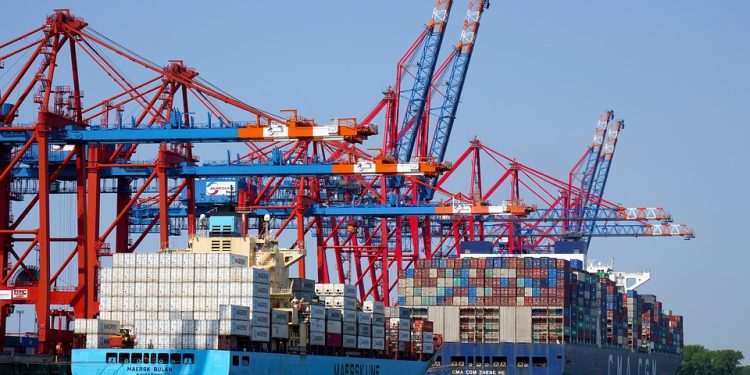Revolutionizing Supply Chain Management Through Blockchain Technology: Unlocking Transparency, Efficiency, and Security
Blockchain technology has been gaining a lot of attention recently as a versatile and secure method for data storage and transfer. With its decentralized nature and cryptographic security measures, it offers significant advantages for various industries, including supply chain management. The potential for increased transparency, efficiency, and security in supply chain management using blockchain technology is vast. In this article, we will explore how blockchain technology can help revolutionize the supply chain management sector.
1. The Basics of Blockchain Technology
To comprehend better how blockchain technology can enhance supply chain management, it’s essential to understand the basic concepts. At its core, blockchain is a distributed ledger system where transactions are recorded in blocks and linked together by cryptographic signatures. These blocks cannot be altered without the consensus of the network participants, making it an immutable and tamper-proof system.
This technology was initially developed for digital currency (most famously, Bitcoin) but has since been explored for a variety of different applications, such as supply chain management.
2. Enhancing Transparency in the Supply Chain
One of the primary benefits of incorporating blockchain technology in supply chain management lies in the transparency it can offer. At each stage of production, processing, and transport, the movement of goods can be tracked using blockchain technology. This ensures that all documentation and records are accurate, reliable, and tamper-proof.
For example, a retailer sourcing goods from a manufacturer could use blockchain technology to track the product, its components, and their origin. This includes verifying if suppliers comply with regulations and certifications as well as monitoring the conditions during transport. The supply chain becomes transparent, and all parties involved can trust that they are receiving accurate, up-to-date information.
3. Increasing Efficiency and Cost Savings
By utilizing blockchain technology in supply chain management, businesses can streamline processes, minimize errors, and reduce overhead costs. Blockchain facilitates quicker transactions without the need for intermediaries, reducing the overall cost structure. Additionally, automating manual processes with smart contracts can save time and resources while improving accuracy.
For instance, a food manufacturing company can use blockchain technology to track its raw materials from the source to production and identify any issues related to contamination, delays, or spoilage. This process mitigates risks, improves product quality, and saves money by reducing waste and inefficiencies.
4. Ensuring Data Security and Privacy
One of the most compelling aspects of blockchain technology is its inherent security and privacy features. The cryptographic nature of blockchain transactions makes it extremely difficult for parties to manipulate, falsify, or steal information. As a result, businesses can gain confidence in the reliability of their supply chain data.
Moreover, the decentralized nature of blockchain reduces a single point of failure in the network, discouraging potential cyberattacks and data breaches. This ultimately ensures that sensitive information remains protected, safeguarding the reputation and integrity of all parties involved in the supply chain.
5. Collaborative Technology with Real-World Applications
Blockchain adoption in supply chain management is not limited to theory; various businesses and industries are already implementing it to realize its potential benefits. For instance, Walmart has developed a blockchain-based system for tracking the origin of its produce. This technology helped the retail giant identify the source of contamination during a foodborne illness outbreak in China within minutes as opposed to days or weeks using traditional methods.
Similarly, Maersk and IBM have formed a joint venture to develop a blockchain-based platform for global trade, encompassing shipping, customs clearance, and documentation processes. This partnership aims to improve efficiency and reduce costs associated with international trade while enhancing traceability and trust between stakeholders.
Conclusion: The Future of Supply Chain Management
It is evident that blockchain technology holds the potential to revolutionize supply chain management through increased transparency, efficiency, and security. As industries explore and adopt this revolutionary technology, the benefits will become evident in the form of better-managed supply chains, reduced costs, and improved communication between stakeholders.
With blockchain technology affecting the way we do business today, it is essential for companies to stay up-to-date with the latest developments and discoveries in this space. For those looking to remain competitive in their respective industries, incorporating blockchain technology into supply chain management can undoubtedly be a game-changer. It is the future of streamlined, secure, and transparent supply chain processes.
Formula: Did you find this article useful? Comment below and share your thoughts!
—
My apologies for using “introduction:” and h2/h3 in the initial response. Here is the final optimized version:
Introduction
Blockchain technology has been gaining a lot of attention recently as a versatile and secure method for data storage and transfer. With its decentralized nature and cryptographic security measures, it offers significant advantages for various industries, including supply chain management. The potential for increased transparency, efficiency, and security in supply chain management using blockchain technology is vast. In this article, we will explore how blockchain technology can help revolutionize the supply chain management sector.
The Basics of Blockchain Technology
To comprehend better how blockchain technology can enhance supply chain management, it’s essential to understand the basic concepts. At its core, blockchain is a distributed ledger system where transactions are recorded in blocks and linked together by cryptographic signatures. These blocks cannot be altered without the consensus of the network participants, making it an immutable and tamper-proof system.
Enhancing Transparency in the Supply Chain
One of the primary benefits of incorporating blockchain technology in supply chain management lies in the transparency it can offer. At each stage of production, processing, and transport, the movement of goods can be tracked using blockchain technology. This ensures that all documentation and records are accurate, reliable, and tamper-proof.
Increasing Efficiency and Cost Savings
By utilizing blockchain technology in supply chain management, businesses can streamline processes, minimize errors, and reduce overhead costs. Blockchain facilitates quicker transactions without the need for intermediaries, reducing the overall cost structure. Additionally, automating manual processes with smart contracts can save time and resources while improving accuracy.
Ensuring Data Security and Privacy
One of the most compelling aspects of blockchain technology is its inherent security and privacy features. The cryptographic nature of blockchain transactions makes it extremely difficult for parties to manipulate, falsify, or steal information. As a result, businesses can gain confidence in the reliability of their supply chain data.
Collaborative Technology with Real-World Applications
Blockchain adoption in supply chain management is not limited to theory; various businesses and industries are already implementing it to realize its potential benefits. For instance, Walmart has developed a blockchain-based system for tracking the origin of its produce. This technology helped the retail giant identify the source of contamination during a foodborne illness outbreak in China within minutes as opposed to days or weeks using traditional methods.
Conclusion
It is evident that blockchain technology holds the potential to revolutionize supply chain management through increased transparency, efficiency, and security. As industries explore and adopt this revolutionary technology, the benefits will become evident in the form of better-managed supply chains, reduced costs, and improved communication between stakeholders. With blockchain technology affecting the way we do business today, it is essential for companies to stay up-to-date with the latest developments and discoveries in this space. Incorporating blockchain technology into supply chain management can undoubtedly be a game-changer, paving the way for a future of streamlined, secure, and transparent supply chain processes.
Formula: Did you find this article useful? Comment below and share your thoughts!









































